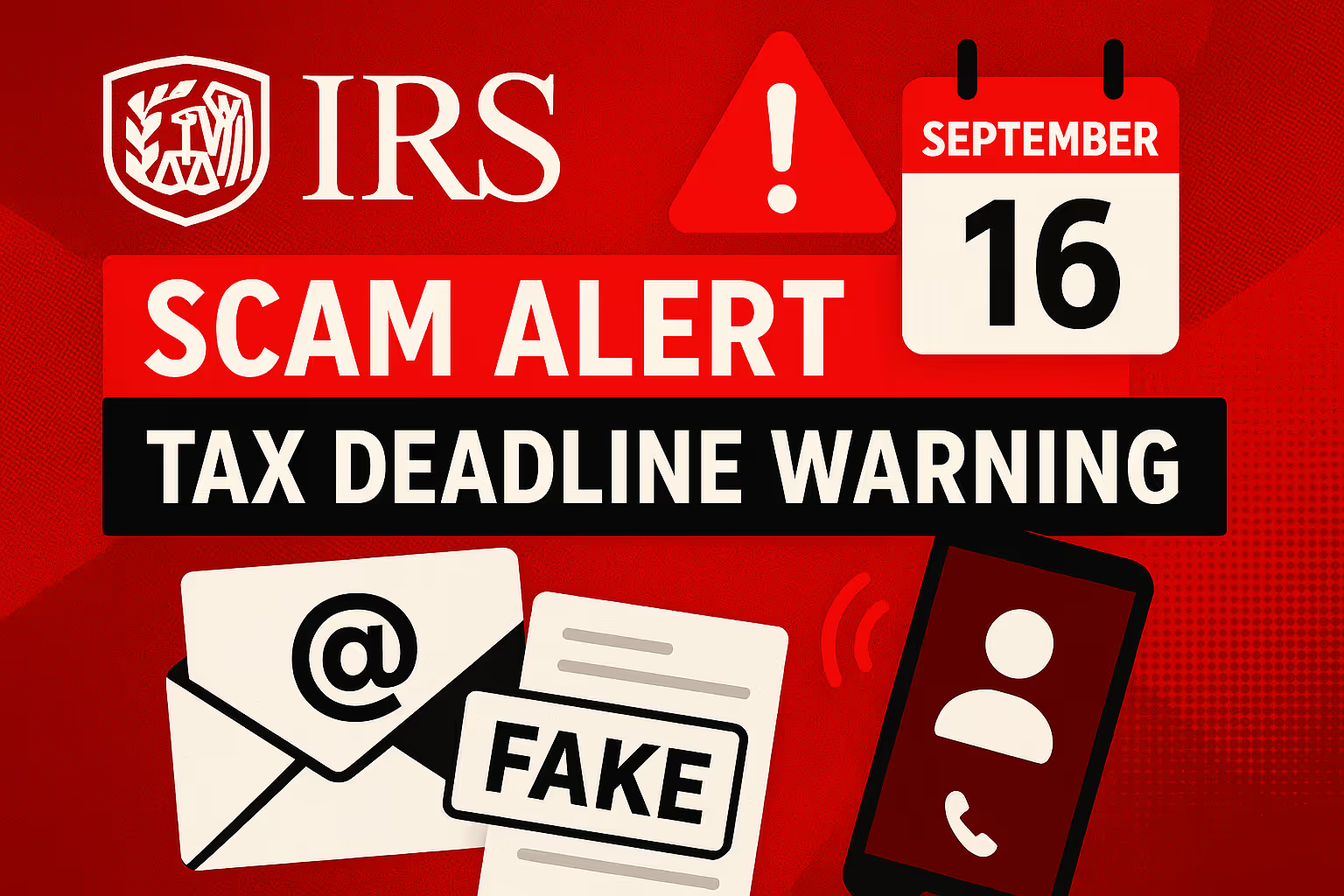
The Internal Revenue Service has issued a fresh warning about the rise of IRS tax scams timed around the September 16 deadline for quarterly estimated tax payments. Officials say criminals are ramping up schemes that pressure people into sharing personal or financial information, with self-employed individuals, independent contractors, and gig workers among those most at risk.
The IRS has reported a surge in tax scams, particularly through text messages and fraudulent emails. These scams mimic official notices, promising quick tax refunds or threatening a sudden tax bill if immediate tax payments are not made. Many of these messages are designed to harvest financial information, requesting access to bank accounts and other financial accounts. In some cases, criminals stage an IRS phone scam, urging victims to pay by wire transfer, prepaid debit card, or gift card.
The September 16 deadline for quarterly estimated taxes is a critical point when scams peak. Taxpayers who owe estimated taxes must calculate and pay based on income earned during the tax year. Missing a due date can trigger penalties, even if the final federal tax return shows a refund. The IRS stresses that penalties may apply if taxpayers fail to pay enough tax through withholding or advance installments.
Groups facing higher exposure include self-employed people, small business owners, independent contractors, and gig workers, who often calculate their tax liability without employer withholding. Scammers exploit this by sending urgent notes that request personal data or instruct recipients to forward the email to supposed IRS agents.
Many attacks arrive as emails claiming to be from the IRS or through fake social media channels. Some include links or scanned images leading to websites that steal confidential information or mimic login portals. Others include requests for similar access information, such as PINs or credit card details.
The U.S. operates on a pay-as-you-go tax model. Instead of paying all at once during tax filing, taxpayers must spread tax payments throughout the year. For those without withholding, this means making quarterly estimated tax payments to avoid interest and penalties.
The 2024 schedule for estimated taxes includes April 15, June 17, September 16, and January 15, 2025 (the final quarterly payment). If a legal holiday falls on a due date, payments move to the next business day. Missing these dates can increase the final tax bill, even when refundable credits later reduce taxable income.
Taxpayers can use IRS Form 1040-ES and online calculators to estimate obligations. The IRS offers resources to check whether all the rules apply in a given case, helping people avoid penalties and ensure they pay enough tax.
There are special rules for farmers, fishermen, disaster victims, and retirees. Adjustments also apply when income earned is uneven across the tax year.
IRS Commissioner Chuck Rettig warned that the latest wave of IRS tax scams amounts to “phishing on an industrial scale.” He explained that criminals now deploy thousands of fraudulent domains within days, each aimed at extracting confidential information. “The best offense is a good defense,” Rettig said, urging taxpayers to be skeptical of any suspicious email or text messages tied to the agency.
The Internal Revenue Service has repeated that it does not initiate contact with taxpayers through social media or email claiming to be official. Messages that include requests for financial information—such as bank account details or access to financial accounts—should be rated as fraudulent. Taxpayers are told to leave the email as is and either forward screenshots or the email to phishing@irs.gov.
The Federal Trade Commission added that fraudsters often aim at self-employed individuals, independent contractors, and gig workers. “Scammers push for payment methods like wire transfer or prepaid debit card because these are hard to trace,” an FTC spokesperson said. The agency advises that anyone who has entered confidential information should secure accounts quickly and report the incident.
Taxpayers should use official methods, such as IRS Direct Pay, EFTPS, the IRS2Go app, or standard mail, to make tax payments. Unsolicited social media messages or suspicious email links directing to payment portals are red flags of a scam.
Fraudulent communications often demand PINs, bank account details, or access to other financial accounts. Any email claiming to be from the IRS that includes requests for similar access information should be considered fraudulent.
Taxpayers are encouraged to report phishing by sending suspicious notes to phishing@irs.gov. The IRS instructs recipients to forward the email or screenshots without editing. Those who have entered confidential information should notify banks or card issuers immediately.
With the September 16 due date for quarterly estimated tax payments, the IRS advises taxpayers—particularly self-employed workers and small business owners—to confirm they’ve paid enough tax. Missing obligations can lead to added charges, even if the federal tax return later results in a refund. Protecting valuable information is as important as staying current on income tax responsibilities.
For updates on IRS tax scams, safe tax filing, and guidance on estimated taxes, visit:
The IRS reminds taxpayers to rely only on irs.gov. Unverified social media posts or an email claiming to be from the IRS should never be trusted.
By William Mc Lee, Editor-in-Chief & Tax Expert—Get Tax Relief Now